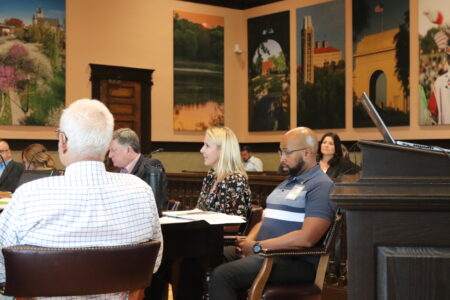As tribal college funding cuts loom, Haskell Foundation aims to raise $300K to support the university in spring 2026

photo by: Josie Heimsoth/Journal-World
President of the Haskell Foundation's Board of Trustees Bo Schneider gives an update on the efforts of the organization on Friday, March 7, 2025.
As Haskell Indian Nations University braces for significant cuts in tribal college funding, a nonprofit that supports the university is seeking $300,000 in donations to help the university get through the next school year.
The Haskell Foundation provides financial assistance and other resources that supplement what the Bureau of Indian Education provides to the university. So far this year, it has raised more than $270,000 in emergency funding for Haskell, but it now says the university will need even more support because of new cuts in President Donald Trump’s budget reconciliation package, the “One Big Beautiful Bill,” which passed this summer.
The legislation is expected to slash federal funding to Haskell along with other postsecondary tribal institutions by 90%.
Kasey Flynt, development director of the Haskell Foundation, told the Journal-World in an email that the foundation has set a $300,000 fundraising goal based on the potential hiring needs for the university, student financial needs and immediate maintenance that is required on campus. This leg of the fundraising campaign is being billed as “Haskell Spring 2026 Support,” and it’s meant to help meet those needs through the end of the upcoming school year.
As the Journal-World has reported, the foundation began its emergency fundraising campaign in February, after dozens of staff members were laid off as part of the Trump administration’s efforts to slash the federal workforce. The goals, Flynt said, were outlined by Haskell’s president at the time, Frank Arpan, and they included raising at least $235,000 to extend temporary contracts to discharged employees, along with helping students affected by grant delays and freezes and ensuring programs stayed funded and intact.
The Haskell Foundation actually surpassed that $235,000 amount; Flynt said the foundation has raised $272,346 since the emergency fundraiser began. But the staffing situation has changed. Laid-off workers were later reinstated, but some chose not to return, and a hiring freeze has made it difficult to fill vacant positions.
On the other hand, because some employees were reinstated, Flynt said the foundation could reallocate the money it had raised, and it decided to use it to “bring contracted staff back for the Fall 2025 semester.”
“Many of the dining and custodial staff chose to not return to their job after the (Department of Government Efficiency) cuts, and with federal hiring freezes the University would not have been able to hire these necessary positions without the funds that were raised,” Flynt said.
The campaign’s website now says that, “Thanks to your help, Haskell has the staff it needs through the end of this year.”
The funding has also been used in other ways to help prepare for the fall semester. The foundation’s August newsletter said that with limited custodial staffing available this summer, some of the funds were spent on professional cleaning services to do a deep clean of all five residence halls.
An impact summary that the Haskell Foundation provided to the Journal-World shows even more things that the foundation has done since the emergency campaign began. The foundation provided $32,865 for transportation, school supplies, computers, books, outpatient treatments, emergency travel, job loss support, rental assistance and other urgent student needs. It also funded championship rings for track, cross country and women’s basketball, along with tournament travel costs for the basketball teams and new uniforms for women’s basketball. And it supported 12 students with “emergency Pell Grant funding” totaling $5,585; the report said these students were at risk of dropping out and the goal was to make sure they stayed enrolled.
Earlier this year, an art auction was held to benefit the foundation. Flynt said the event raised $43,419, and that money will go toward replacing the deteriorated sign at the Haskell Cultural Center and purchasing supplies for archiving historic documents.
Now, with the fall semester about to begin, the foundation’s focus turns to the spring of 2026. Flynt said the new $300,000 goal was informed by the decisions the foundation had to make this fall.
“We had to decide between funding priorities when utilizing the emergency funds for Fall 2025, so $300,000 would have been able to fill that need,” Flynt said via email.
The foundation isn’t just urging people to donate. Its website also encourages people to contact the Secretary of the Interior and representatives in Congress about the situation at Haskell.
As the Journal-World has reported, some lawmakers in Congress are interested in reforming how Haskell operates. U.S. Sens. Jerry Moran, R-Kan., Roger Marshall, R-Kan., and Markwayne Mullin, R-Okla., and U.S. Reps. Tracey Mann and Derek Schmidt, both Kansas Republicans, introduced the “Haskell Indian Nations University Improvement Act” at the end of June. The bill would remove control of Haskell from the federal government and let the university govern itself.
The Journal-World also reached out to Moran and Mann’s offices regarding the status of the proposed Haskell legislation, but neither responded as of Wednesday afternoon.
Those interested in learning more and donating to the emergency campaign can visit www.haskellfoundation.org.






